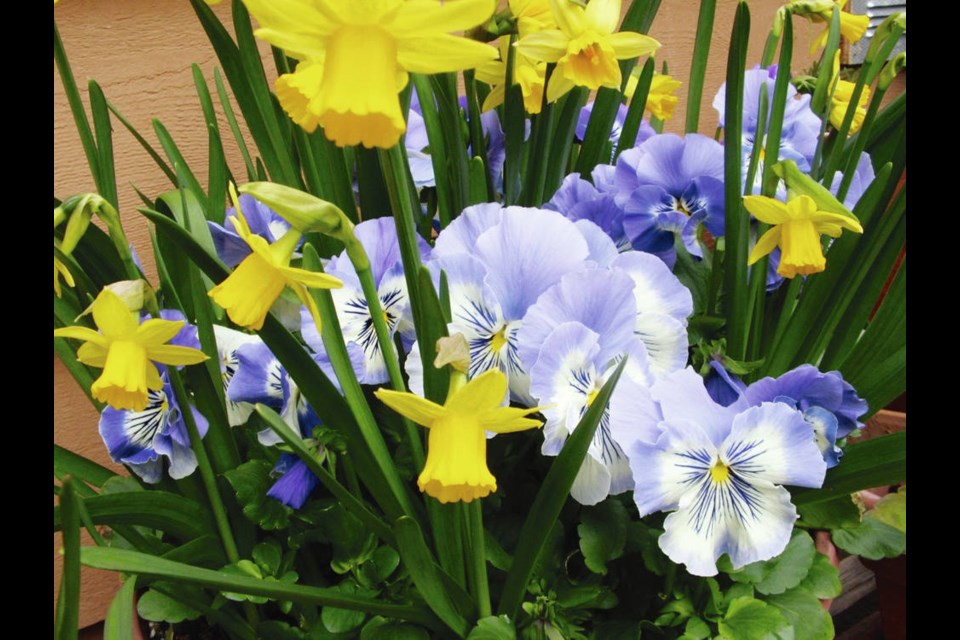The sunny, warm(ish) days beginning to dot the weather landscape are glimpses into balmy days ahead. Meanwhile, the early spring brings its own familiar pleasures. Sheets of crocuses shine in the sun. Primroses, heathers, pansies, daffodils and sweet violets brighten the landscape with colour and fragrance. Birds are nest building.
Clothes hanging out on a line in a neighbour’s yard at mid-month was a season “first.” I’ll soon be using my fold-out racks on the patio for drying laundry on sunny days. I love the fragrance of sheets, towels and clothing that have dried outdoors in the sun.
The good earth. Last spring’s extreme enthusiasm for growing a garden is clearly evident again this year. People are clamouring for seeds, supplies, and information on how to prepare for successful plantings.
My mail abounds with questions: How do I build up the soil in my vegetable plot? Too many choices are available. What if I don’t have enough of my own compost? What kind of lime to use? Is all lime the same? What about mulching — when, and with what?
Mail like this reflects good instincts, for in the soil lies the secret to a healthy, thriving, productive garden. This is particularly true in food gardens. Feed the soil and it will feed you.
For people starting out, first find out how much soil you have in the garden area you have chosen. Use a sharp-edged digging shovel to slice straight downward into the earth and lift up the shovel’s contents. As long as there is at least 30 cm of useable soil, even if it’s not perfect in texture, the best way to prepare the plot for planting will be to dig in a five to 10 cm layer of good quality compost, lime, and an all-purpose, preferably natural-source, fertilizer.
Not enough compost on hand? Look for bags of compost where garden supplies are sold. Buy one to assess at home before acquiring more. It should have solid substance and feel like soil. You don’t want a lightweight product like a potting mix for this purpose.
For large amounts to be delivered, research locally available composts carefully and ask other gardeners and garden centre personnel for advice. If possible, personally check out a product before ordering.
Lime. Most gardeners use dolomite lime, which contains magnesium as well as calcium. Dolopril is a fast-acting, pelletted form. It was when I began using Dolopril to lime the soil that I was able, at last, to grow fine spinach and beet plantings in my garden’s soil.
Mulch. Organic matter like compost in the soil enhances the soil’s fertility. It also helps in moisture retention and reduces the need to water. Mulches, applied around plants and between rows as the soil begins to warm seriously in May or early June, help to cool the soil and further conserve moisture.
My preferred mulch is compost. Straw placed over a compost (or other) mulch, because of its light colour, deflects sunlight to further cool and conserve moisture.
Other commonly used mulches are shallow layers of grass clippings, well aged sawdust, and small or chopped leaves that have been set aside. Water deeply before applying mulches.
Online transactions. Thanks to Lynda for her useful comment on a question I answered in the March 10 column.
The issue was ordering seeds online. I’d just made my first online order, after obtaining advice at my bank on the safest payment method. I omitted mentioning an important piece of advice. Lynda reminded me: “What has kept me comfortable ordering online or by phone is using a credit card with a very low limit, used for that purpose only. I don’t have to worry about someone fraudulently running up a bill.”
Easter in watercolour. The Horticulture Centre of the 91ԭ�� is offering an online course via Zoom: Watercolours with Richard Wong — Celebrating Easter, on Saturday, April 3, 1 to 3 p.m. Cost is $20 per screen. A list of needed supplies will be mailed to participants. For details and online registration go to hcp.ca/events. The site’s home page also lists courses. Or phone 250-479-6162 to register.
Master gardeners information service. Because Victoria Master Gardeners are unable to hold face-to-face clinics at this time, they are answering gardening questions by email at [email protected]. For information about the organization and more about the helpline visit victoriamastergardeners.org.



